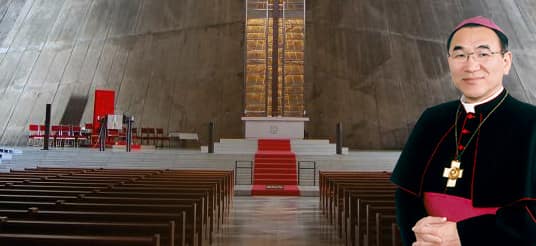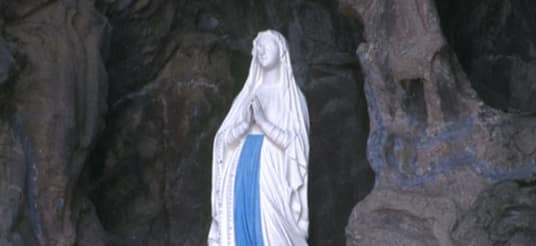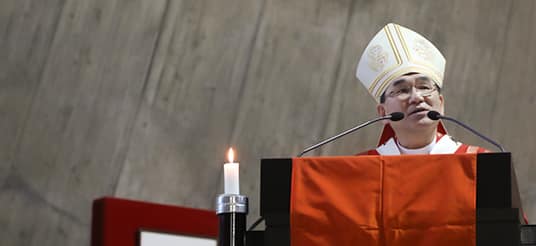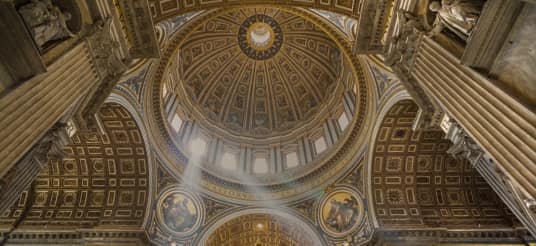Archdiocese of Tokyo

Homily at the votive Mass for Peace
May 14, 2007
First Reading: The letter of St. Paul to the Romans 12. 9-18
Gospel: St. Luke 6. 27-36
Dear brothers and sisters in Jesus Christ, it is my great joy to offer this Mass for votive peace together with you all during the Tokyo archdiocese “Ten Days of Prayer for Peace.”
August 15th is coming soon. The day of August 15th in 1945 was a very significant and unforgettable day for all human beings, and especially for all Japanese. On this day the Asia-Pacific War ended and the Second World War also came to an end. Many Christians had joined in this war too.
Or rather should we say that they had no other choice but were drawn into direct involvement in the war? All human beings have experienced deeply over and over again how wars have been miserable and inhuman. We seek everlasting peace, and so after each war renew our resolution that we will not spare our efforts to work and cooperate together for peace.
War is never the will of God. Today’s reading and gospel explain this clearly and teach us plainly.
Jesus taught us to love even enemies. Originally we human beings are more brothers and sisters to each each other than enemies (as Sister Hirota mentioned just before) and no enemies should exist.
St. Paul taught us to hate evil but to pray for those who persecute us. He admonishes us not to take revenge against an evil deed on us rather to do every person a good turn. This is the teaching of “non violence”—we should not respond to violence by our violence. “Non violence” is, according to Sister Hirota’s talk, not to hurt the minds & bodies of other people by our acts, words, and attitude, and this is not easy to practice. But the person who actually had practiced this in his life is no less a person than Jesus of Nazareth, in whom God became man. We have no other way to follow but the way of Jesus. This teaching of the Bible has been reflected on the Constitution of Japan. In Japan Christians are not a majority religion. We can see that the Constitution of Japan represents the ideas of the Gospel. We should protect and spread this constitution, this Peace Constitution, with deep devotion
Our Father in heaven we believe in is the Father of all people. For God every person is His precious child whom He loves and so there is no friend or foe before His eyes. When His children fight each other how much it grieves His heart. How much more so does it break His heart when they bring about wars?
War is really mutual murder by the opponents. In history it is an obvious fact that Christians provoked wars against each other. Christians were hostile to one another, repeated cruel massacres, and prayed to God to win their own victory. How will God respond to those contradictory prayers which were offered before Him? In the midst of the Asia-Pacific War, various Japanese religious groups offered their prayers for the victory of their own country. Catholics in Japan had to do the same. On the other hand, it it certain that there were many Catholics among Asian peoples who fought against Japan.
How sad it was that Christians prayed for the extermination of other Christian brothers and sisters in the same war. We should pray to God for peace, reconciliation and salvation of the precious lives each other?
Recently I read the book written by the 16th president of U.S.A., Abraham Lincoln and was impressed deeply by his speeches. Needles to say he was a great politician who had won over the Civil War and accomplished the emancipation of slaves legally. In our generation who have been educated along with “postwar democracy” he is a presented as a great hero. This might be largely of my own interpretation, but I really think that he was a true Christian. He wrote as follows:
“(North and South) Both read the same Bible, and pray to the same God; and each invokes His aid against the other. It may seem strange that any men should dare to ask a just God’s assistance in wringing their bread from the sweat of other men’s faces; but let us judge not that we be not judged. The prayers of both could not be answered; that of neither has been answered fully. The Almighty has his own purposes. “Woe unto the world because of offences! for it must needs be that offences come; but woe to that man by whom the offence cometh!” If we shall suppose that American slavery is one of those offences which, in the providence of God, must needs come, but which, having continued through His appointed time, He now wills to remove, and that He gives to both North and South, this terrible war, as the woe due to those by whom the offence came, shall we discern therein any departure from those divine attributes which the believers in a Living God always ascribe to Him? Fondly do we hope—fervently do we pray—that this mighty scourge of war may speedily pass away.
With malice toward none; with charity for all; with firmness in the right, as God gives us to see the right, let us strive on to finish the work we are in; to bind up the nation’s wounds; to care for him who shall have borne the battle, and for his widow, and his orphan—to do all which may achieve and cherish a just and lasting peace, among ourselves, and with all nations.”
Being encouraged by his speech, let us pray with hope for the realization of peace, and cooperate together by endurance based on truth, without any evil intention or hatred. We should have peace in our own hearts first of all, so that we will be able to put into practice these efforts for peace.
Let us seek and pray for peace with God, and may God always fill our hearts with the grace of being reconciled with Him.
St Mary’s Cathedral Tokyo
Aug 11, 2007





